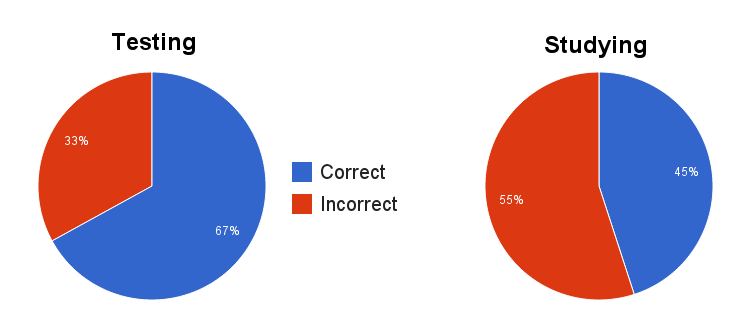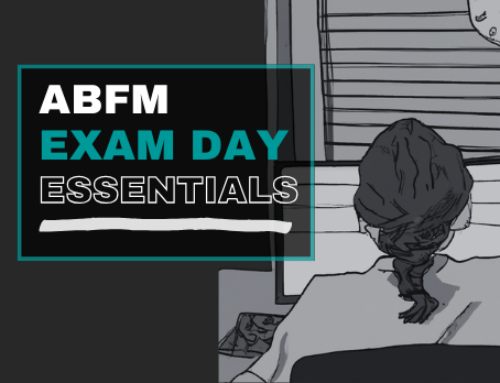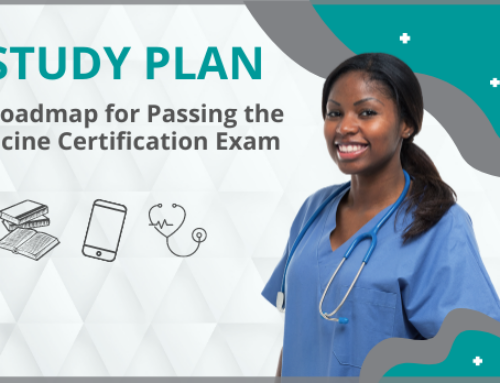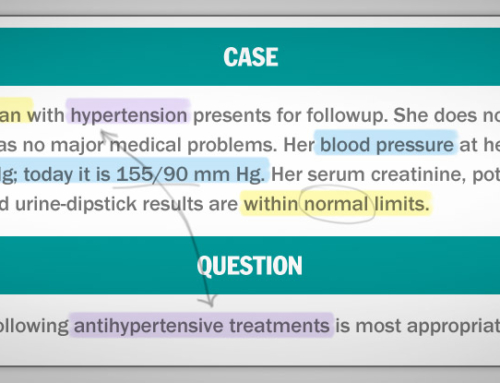You have been taking high-stakes exams your whole life, and here you are preparing for the Board Certification or Maintenance of Certification exam, probably just as nervous as ever. That’s natural! But knowing how to study for the boards and avoiding mistakes is crucial. After all, failing the exam can have repercussions, and you don’t want to have to retake it.
Unfortunately, learners at all levels have misconceptions about learning. Many of us don’t know which learning methods are most effective and we often prepare for exams using inefficient strategies. To help you use your limited time in the most efficient ways possible, we’ve pulled together ten mistakes to avoid and ten strategies to deploy when you’re studying for the boards.
10 Mistakes to Avoid When Studying for Board Exams
Many people are unfamiliar with the latest information about how to learn. What’s more, the following common misconceptions are not harmless; faith in them can lead to failure:
1. Believing that being good at a subject is a matter of inborn talent rather than hard work
Have you always been strong in certain topics? Do you tell yourself that your success is a result of your inborn intelligence and natural skill? Conversely, have you told yourself you’re just “bad” at something and no matter what you do, it will always be hard for you? Well, this line of thought is hurting your ability to learn and improve your performance. Studies show that people who think that ability is innate tend not to work hard or persevere. On the contrary, a growth mindset — the belief that intelligence is not fixed and can be developed—is a strong predictor of achievement.
2. Assuming that learning is fast
With the limited time you have to prepare for your board exam, it would be nice if learning new things (and reminding yourself of things you once knew by heart) were a quick process. However, if you want to understand the learning material and remember it, you need to be prepared to spend some time on it.
3. Thinking that knowledge is composed of isolated facts
Less seasoned learners try to memorize items independent of their relationships with interrelated concepts. Reading through a textbook and underlining important nuggets may make you feel like you’re learning, but looking over those terms later will not help you synthesize information coherently — and will not be useful in retrieving knowledge in the real world.
Robert Bjork, PhD, a well-known expert on learning and memory, wrote that we do not “store information in our long-term memories by making any kind of literal recording of that information but, rather, by relating that new information to what we already know…and the retrieval of stored information is a fallible, probabilistic process that is more inferential and reconstructive than literal.”
4. Believing that multitasking is easy, especially during class or study time
Focusing on two or more tasks at a time is a fact of life, but believing that you can do more than one thing at a time effectively is a myth. You may convince yourself you have both read up on the contraindications for a new medication and listened to your mom berate you for not calling often enough at the same time, but neuroscience studies show that your brain was in fact switching back and forth between these two tasks, and you are likely to have missed important information in the meantime. Nancy K. Napier, PhD, in Psychology Today says, “That start/stop/start process is rough on us: rather than saving time, it costs time (even very small micro seconds), it’s less efficient, we make more mistakes, and over time it can be energy sapping.”
Sadly, believing in the multitasking myth has even led to medical errors.
Bad Decisions in Studying for the Board Exam
The reality is that you have a limited amount of time for studying for board exams, so it makes sense to have a plan of attack. Don’t fall into the following traps, and you’ll have a better chance of success when studying for the boards.
5. Relying too much on your instructors to prepare you
Our brains acquire and retain knowledge best under certain conditions: when we need the knowledge at that moment in time and when the new information has context. The majority of learners who are taking courses to prepare for the boards and residents taking their assigned roster of courses assume that if they attend class, listen and take notes, look over the study guides instructors have handed out, and so on, they will be ready. Textbooks, handouts, study guides, and slide decks can be a great starting place, but just being present and reading over the materials is not enough to guarantee that you will do well on the exam.
If you are committed to succeeding, you need to take responsibility for ensuring that you truly understand the material. One way to do this if you are a resident is to use your residency as a learning tool. If you’re preparing for your recertification exam, be sure to leverage opportunities for learning at the point of care.
6. Not leaving enough time to study
It may seem like the best strategy for success would be some concentrated cramming sessions close to exam time, but with the large scope of knowledge you need to commit to memory, it is likely you will underestimate the amount of time it will take to learn all the material. Given that you’re a busy person, you’re going to want to hold at least some of that knowledge in your long-term memory, and that means not forgetting what you learned at the beginning of your study sessions. Repeated studies have shown that spaced repetition is the most effective method for retaining learning over the long term.
But if you’ve found yourself short on time to prepare (we’ve all been there), consider using NEJM Knowledge+ Board Review, which features authentic adaptive learning technology that adjusts content based on what you already know or don’t know to make your study time as efficient as possible.
7. Studying in an arbitrary, rather than priority order
You can’t know exactly what’s going to be on the exam, but the boards do publish blueprints showing what portion of the exam will be on the various topics (e.g., cardiology 14%, ophthalmology 1%, etc.) as well as (for the Internal Medicine board exam) which tasks (diagnosis vs. treatment) are more likely to be tested on for a given topic. So, it would be better not to go down the list of topics alphabetically when preparing for board exams but to use study materials that are proportional to what’s covered on the exam — and to focus your attention on the highest priority items. You can find information on your specialty’s blueprint below:
Internal Medicine
Family Medicine
Pediatrics
8. Wasting time reinforcing your strengths
It is a common error to believe you know more than you do; this mistake arises from ignorance rather than arrogance. Psychologists have shown that one of the main differences between strong and weak learners is that the latter have poor metacognition. Many learners gravitate toward reviewing and even testing themselves on subjects they already understand rather than delving into topics they are not sure they know very well or at all. For example, NEJM Knowledge+ gives you the option of choosing which subspecialty module you want to do first, and allows you to switch between modules at will. Would you start with the module you are most comfortable in or with a module you know you are going to answer most questions wrong at first?
People tend to like doing what they are good at; it makes them feel confident and sure of themselves. The problem is, you really need to learn in the areas you are least comfortable with, or you will run out of time to tackle the problems that you find difficult.
9. Using passive study strategies
The most common method of studying for the boards is reading, reinforcing your knowledge through repeatedly reminding yourself of the information you have to remember. It is also the most passive method and leads to poor memory retention. Henry Roediger and Jeffrey Karpicke, psychologists at Washington University, found that, “Relative to testing, repeated studying inflated students’ confidence…even though repeated-study subjects actually showed much poorer retention on delayed tests.” Which brings us to…
10. Not testing yourself on the material
As Roediger and Karpicke wrote in their 2006 research article in Psychological Science, “Testing has a powerful effect on long-term retention.”
The testing effect is real. Dozens of studies show that you will recall 50% more of learned information by testing yourself than by using the same amount of time to study (for example, one research team found a score difference of 67% with testing vs. 45% with studying).
The good news is that all of these mistakes are avoidable.
Research suggests that if you learn about effective study strategies, you are more likely to abandon mythmaking, adopt effective approaches, and succeed on your board exam than people who have not been exposed to this information.
How to Study for Boards: 10 Tips and Strategies to Prepare for Your Board Exam
Now that we’ve told you the mistakes to avoid, let’s look at strategies that are proven to work and help you pass your board exam. Check out the video below for a quick overview and continue reading for more detailed information.
1. Discover your learning style
The methods others use won’t necessarily be as effective for you — including those used by members of your study cohort. Are you a visual or an auditory learner? Finding out which style works best for you is something to consider in the early stages of preparing for board exams. If you are a visual learner, try videos (like NEJM Quick Take). If you are an auditory learner, record lectures and play them back. Adaptive learning works especially well for those looking for a dynamic experience that is based on learning theory and science.
2. Plan to continually and consistently put in the time
As we mentioned above, mastering the material you need to know for the boards will take some time — perhaps more than you bargained for. With all of your obligations, it can be hard enough to find the time to get enough sleep, let alone put it in an hour or two of studying every night leading up to the board exam. Before registering for your exam, do your best to allocate study hours over a larger period of time.
Bonus tip: If you use public transportation, try studying during your morning and evening commutes, or perhaps during your morning exercise routine. All of that time adds up!
3. Start a study group
Preparing for board exams with your friends is a great way to help address each other’s weaknesses. You may have one area completely covered to the point where you can be the teacher in that group, yet struggle immensely in another area.
4. Avoid burnout
The last thing you want is to be burned out studying. It can be extremely beneficial to take study breaks. Research suggests that doing something you enjoy the day before the exam has a more positive effect than continuing to study up to the last minute.
5. Exercise during your breaks
According to this study reviewed by Harvard Health, those who exercise with moderate intensity 30 minutes per day, every day, have improved memory and concentration. If you feel as though you’re in a fog, start exercising regularly.
Also, try using the Pomodoro Technique and doing light exercise during the breaks. The Pomodoro Technique is a time-management strategy designed to promote focus and discourage procrastination. It involves setting a timer for 25 minutes, during which you concentrate on a task (such as studying for your board exam). When the timer goes off, you take a five-minute break. After four or five Pomodoros, you take a longer 30-minute break. During the breaks, you can do light exercise such as yoga, walking, or dancing to your favorite playlist.
6. Take advantage of digital resources to study for boards
There are numerous apps and digital tools that allow you to create a study schedule, make your own flashcards and tests, or even answer case-based questions like the ones on the exam. Reviewing board exam flash cards (or fill-in-the-blank questions like those in NEJM Knowledge+) on the bus is a lot easier than trying to search through a textbook for a specific review section.
To practice answering questions like the ones on the exam, sign up for our weekly NEJM Knowledge+ Question of the Week, and get case-based questions delivered to your inbox for free.
7. Find a better study environment
Above, we recommended studying during your commute or even while exercising to maximize your time. That said, it’s important to spend most of your time studying somewhere that is free from as many distractions as possible. If you’re studying for your exam in front of a TV, chances are you won’t be very productive. Try finding a quiet corner in your local library that you can rely on for a focused study session.
8. Prioritize challenging subjects
As we noted above, it’s tempting to procrastinate on the harder subjects — but you don’t want to be caught without enough time to master them. Do you know what you know and what you don’t know? Knowing which subjects present the biggest challenge to you allows you to decide how much time you’ll dedicate to them versus reviewing what you’re more comfortable with.
9. Get enough sleep!
We know you know this. We also know how hard it is to achieve. But to emphasize just how important sleep is, check out this study published in Nature that shows how much irregular sleep can impact your academic performance. Aim for at least 7 hours of uninterrupted sleep.
10. Test yourself
Testing yourself may just be the best way to study for boards. As we’ve noted, studying by reading over your materials and not testing yourself may be the biggest mistake you can make in preparing for your exam exam. One effective method of assessing your knowledge is to use practice exams, which simulate the timed environment of the actual board exam you’re taking.
The reason taking practice tests helps is they reinforce your knowledge by asking your brain to struggle with recalling the answers, and practice tests can prevent the effects of stress on memory. According to this study by Smith et al., when participants’ studied using practice tests, they experienced fewer of the typical negative effects of stress — such as forgetting the answers.
Being prepared for test day means knowing what it feels like to take the exam under pressure. For example, NEJM Knowledge+ contains two 60-question practice exams that simulate the actual timed exam. Questions in the practice exams align with the exam blueprint. Adding this layer of realism to your prep can increase your confidence and help you be more confident on exam day.
There you have it — HOW TO STUDY FOR THE BOARDS—10 Mistakes to Avoid When Studying for Board Exams and 10 Ways to Prepare for Your Board Exam that will help you to build confidence, maximize your study time, and pass the exam!
Learn more about NEJM Knowledge+ Board Review to accelerate your learning today!
This blog post was updated on 7/12/22.











Outstanding!
I just loved this article! As a former high school teacher, I know well the study mistakes students make – esp. studying what you already know.
Every time I mentioned this mistake to a student and/or parent it was like an epiphany. Oh, and telling students about this study mistake needs to be done individually. Students who make this mistake don’t hear the suggestion when told to the entire class.
I always suggested that students list what they know (yes, handwrite the list!), put a check by it (give credit to yourself which gives confidence), and then move on!
Great tips!
I would like to ad only one last issue: the final goal of to study some material (themes like Internal Medicine-Surgery-Pathology etc etc )is to achieve or to get an Synthesis of all themes related.It is not possible to study,with an isolated technique, not trying to obtain this fusion needed.
When we are facing a patient with an disease, we need to use an total synthesis of all we learned during our study in Medical School., to achieve the right diagnostics.
Hi, thanks for sharing common mistakes and tips for preparing for pre-board exam 2018. Your tips are easy to use and meaningful. Now I am easily prepared for my pre-board exams.
Fabulous..such good service.” Thank you… I have never had such good service.
Irresistible! Thank you so much for this kind and good service.your services is better than better.